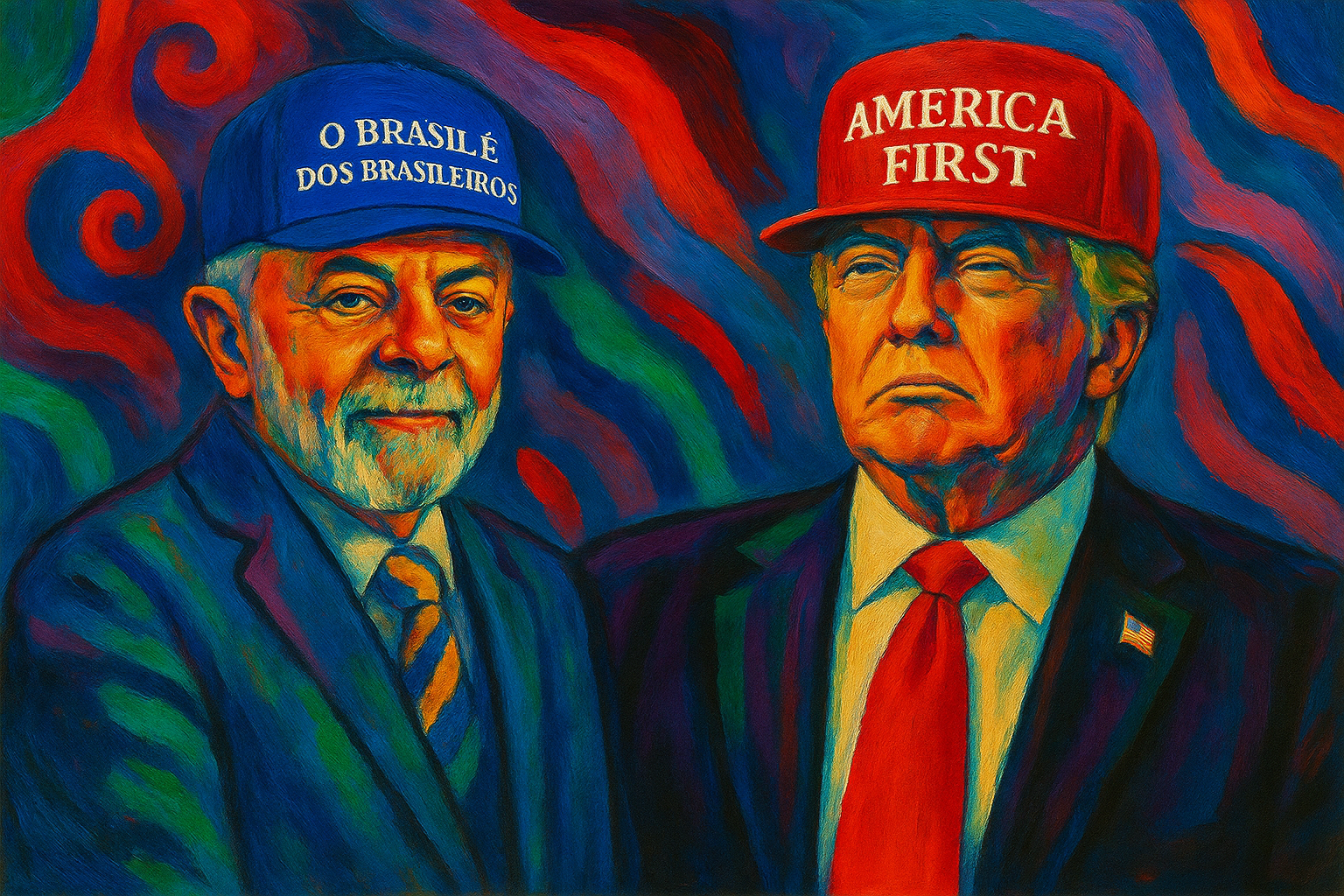Trump, the boreal Lula
Trump, the boreal Lula

Donald Trump has more in common with Luiz Inácio Lula da Silva than he would ever admit.
Anyone familiar with Lula’s way of steering the economy will recognise it in Trump’s trade and industrial policy. Lula is the benchmark for a populist-led market economy, where the state intervenes, shields strategic sectors, and utilizes economic power to achieve political and geopolitical objectives.
Thoroughly South American. From Perón’s Argentina to Chávez’s Venezuela, this model has been employed time and again. Trump is doing in the North what Lula has long done in the tropics — only more forcefully, and with the added use of economic power for direct interference in foreign politics.
At the beginning of August 2025, Trump imposed a 50 per cent import tariff on a wide range of Brazilian products. The White House did not link the measure to a trade surplus or an economic threat, but to the trial of former president Jair Bolsonaro — Trump’s political ally. Lula refused direct negotiations, sought support from other major powers, and made it clear that Brazil would not be dictated to.
Trade as a diplomatic weapon
Like Trump, Lula uses trade as leverage. He ties every economic instrument to a broader political purpose. Two recent examples:
The BRICS – After the American tariffs, Lula convened the leaders of China, India and other BRICS partners. He sought to build a united front and turned a bilateral quarrel into a question of power between Washington and a bloc of emerging economies.
Strategic minerals – Lula is developing a national strategy for critical resources such as lithium and rare earths. He has declared these a matter of “national sovereignty” and uses exports and investments as leverage in international negotiations.
Unlike his Northern counterpart, Lula employs trade mainly in a defensive fashion: to protect Brazil from external pressure and to preserve room for domestic policy.
Trump in Lula’s footsteps, but harsher
Trump uses the same instruments, but far more aggressively. As leader of the world’s largest economy, he commands a lever that Lula does not possess: a single tariff decision from Washington can disrupt entire sectors or economies elsewhere. Whereas Lula usually links economic pressure to trade or geopolitical dossiers, Trump also uses it for direct influence on the domestic politics of other nations.
The 50 per cent tariff on Brazilian products is a case in point. It was not designed to protect American industry, but to place Brazil under pressure in Bolsonaro’s trial. Lula seized upon this to attack his opponent head-on: Bolsonaro, he said, is “a traitor to the nation” for inviting Trump to interfere in Brazil’s legal order. Lula, not unjustly, framed the conflict as a matter of national honour.
An unintended trump card
Trump thus inadvertently handed Lula a powerful card. The tariff decision enabled Lula to present himself as the defender of Brazilian sovereignty, above party politics. In a country where national pride runs deep, Lula mobilised support far beyond his own constituency. His message was simple: whoever resists foreign meddling is defending Brazil.
Key figures: the American 50 per cent tariff
(in force since 6 August 2025)
Total Brazilian exports to the US: around 12–13% of overall exports
Share of exports affected: approx. 36% of exports to the US (after c. 700 product exemptions)
Total value of goods affected: more than 50% of exports to the US when all existing and new tariffs are included
Main sectors affected:
Coffee – iconic export product, entirely subject to the 50% tariff
Meat – chiefly beef and poultry
Fruit and vegetables – including tropical fruit and processed products
Textiles and clothing – especially from Brazil’s North-East
Footwear and leather – a traditional export strength
Economic impact:
Possible contraction of 0.15 percentage points of GDP in 2025
Severe impact on regions with low value-added exports, such as the North-East
A state-led economy in two climates
Trump presents himself as a champion of free enterprise, yet, like Lula, he relies on left-leaning, state-led instruments: import tariffs, sanctions, exemptions and industrial strategy. Even a strategic state share by Trump in Intel is strikingly Brazilian in nature. The state directs the economy, and political priorities prevail. In Brazil, Lula packages this in left-wing trade union language; in the US, Trump does so with blue-collar “America First” rhetoric — but the essence is the same.
Milei as a counter-example
Argentina’s president, Javier Milei, proves that populism does not always lead to economic nationalism. He shares with Lula and Trump a political style — sharp, polarising, anti-establishment — yet opts for radical liberalisation: privatisation, the removal of trade barriers, and maximum exposure to competition. Even so, geopolitically, he is an ally of Trump. This shows that Lula’s model is only one possible form of populist economics, though it is the blueprint Trump most closely follows.
Political context: sovereignty and prestige
In this tariff war, Lula can position himself as the guardian of national sovereignty. He refuses to be humiliated in direct talks with Trump and uses the conflict to build domestic prestige. That Trump openly tied his sanctions to the trial against Bolsonaro reinforced the image of an American president meddling in Brazil’s legal order. And this is certainly not the first time in history. With his assault on Brazilian sovereignty, Trump has mainly brought his friend Bolsonaro reputational damage and political loss.
The benchmark for economic populists
Anyone seeking to understand Trump as an economic populist need only look to Lula. Both deploy trade as a weapon, steer the market with a political hand, and place national interests above international rules. The difference: Trump exploits America’s economic dominance to forcefully impose his political agenda — even to the extent of influencing foreign political processes. Their economic philosophy differs little, but Lula plays his cards far more shrewdly, achieving with an apparently light touch what Trump tries to bludgeon into existence.



